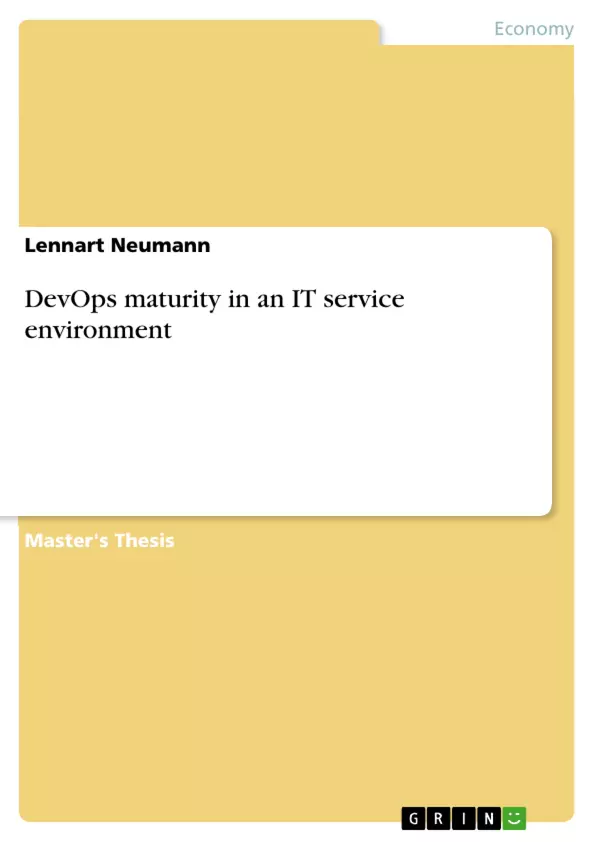This thesis acknowledges DevOps as a relevant trend in information systems (IS) research and IT organizations. DevOps will be examined with a focus on characteristics and aspects of implementation and maturity. A maturity model is developed in the context of an organization, based on literary and empirical research.
Businesses increasingly depend on IT in order to sell their products and services. Shorter time-to-market is essential and agile software development approaches have emerged, improving collaboration and planning between business and software development. However, while software can be developed iteratively with higher performance and efficiency, these efforts are in vain when IT operations are left out of these changes. Furthermore, iterative development techniques cannot tap the full potential and shorter time-to-market is not achieved while deployments are only possible once every six months. DevOps addresses these problems by promoting shorter release cycles and improved collaboration between development and operations professionals.
This thesis uses a systematic literature review to characterize DevOps and determine implementation criteria. Using Action Design Research and interviews at an organization, a maturity model is created to visualize these learnings and give practitioners the ability to assess their organization’s DevOps performance. Consecutively, the model is applied to two environments of different DevOps maturity in an IT service environment.
Table of Contents
- Introduction
- Motivation
- Research Questions
- Research Design
- Outline / Remainder
- Research Methods
- Literature Review Methods
- Empirical Methods
- Literature Review
- Scope
- Research Process
- Systematic Literature Review
- Targeted Review
- Results
- Systematic Literature Review
- Targeted Review
- Empirical Research
- Case Description
- Research Process
- Results
- Practitioner Perception of DevOps
- Model Revision, Iteration 1
- Model Revision, Iteration 2
- The DevOps Assessment Model
- Model Presentation
- The DevOps Mindset Assessment
- The DevOps Capability Assessment
- Model Development
- Managerial Implications on Using the DevOps Assessment Model
- Evaluation
- Summative
- Formative
- Discussion, Limitations, Future Research
Objectives and Key Themes
This master thesis examines the concept of DevOps and its practical application in an IT service environment. The main objective is to develop and evaluate a maturity model that can be used to assess an organization's DevOps performance. This model is intended to help practitioners understand their current state of DevOps maturity and identify areas for improvement.
- Characteristics and implementation criteria of DevOps
- Development of a maturity model for assessing DevOps performance
- Application of the maturity model in real-world IT service environments
- Evaluation of the model's effectiveness and potential limitations
- Recommendations for future research and application of the DevOps assessment model
Chapter Summaries
- Introduction: This chapter provides a motivation for the research, outlines the research questions, and introduces the research design. It also briefly discusses the organization of the thesis.
- Research Methods: This chapter describes the methods used in the literature review and empirical research. It explains the systematic literature review process, the targeted review, and the action design research approach employed for the empirical study.
- Literature Review: This chapter presents the findings from the systematic and targeted literature reviews. It examines the existing research on DevOps, including its outcomes, culture and mindset, organizational environment, automation, and tools.
- Empirical Research: This chapter describes the empirical study conducted in an IT service environment. It includes details on the case description, the research process, and the results obtained from interviews and workshops with practitioners.
- The DevOps Assessment Model: This chapter presents the developed DevOps assessment model, which consists of a mindset assessment and a capability assessment. It discusses the model's structure, development, and potential implications for managers.
- Evaluation: This chapter evaluates the DevOps assessment model based on its summative and formative aspects. It assesses the model's effectiveness, limitations, and future research opportunities.
Keywords
This master thesis focuses on the key concepts of DevOps, maturity models, IT service management, and continuous delivery. The research investigates the characteristics of DevOps, develops a maturity model for assessing DevOps performance, and evaluates the model's application in an IT service environment. The work emphasizes the importance of understanding the DevOps maturity level to improve collaboration, communication, and efficiency in software development and IT operations.
Frequently Asked Questions
What is the primary objective of this thesis on DevOps?
The main objective is to develop a maturity model to assess an organization's DevOps performance and identify areas for improvement within an IT service environment.
Why is DevOps important for modern businesses?
DevOps addresses the gap between agile software development and IT operations, enabling shorter release cycles, improved collaboration, and faster time-to-market for products and services.
What are the components of the developed DevOps Assessment Model?
The model consists of two main parts: a DevOps Mindset Assessment and a DevOps Capability Assessment.
What research methods were used in this study?
The thesis employed a systematic literature review to define DevOps criteria and Action Design Research (ADR) combined with practitioner interviews for the empirical part.
What are the key themes explored in the literature review?
Key themes include DevOps culture and mindset, organizational environment, automation, tools, and the outcomes of implementing DevOps practices.
How was the maturity model evaluated?
The model was applied to two different IT service environments with varying levels of DevOps maturity and evaluated through both summative and formative assessments.
- Citar trabajo
- Lennart Neumann (Autor), 2017, DevOps maturity in an IT service environment, Múnich, GRIN Verlag, https://www.grin.com/document/461906



